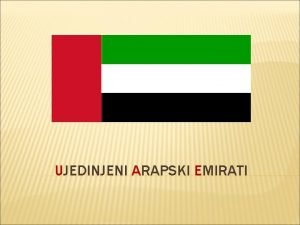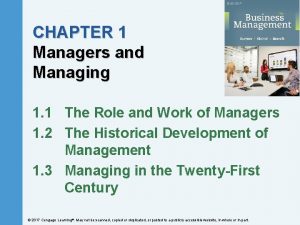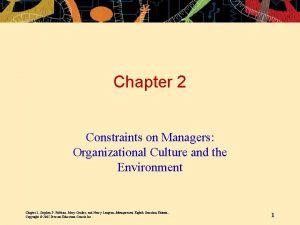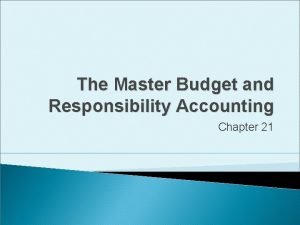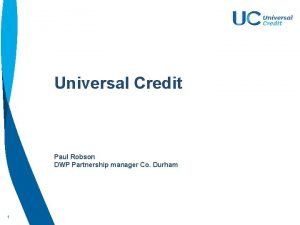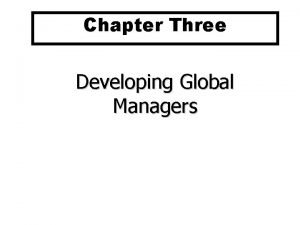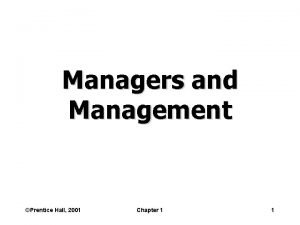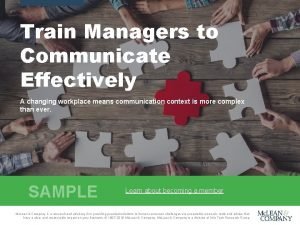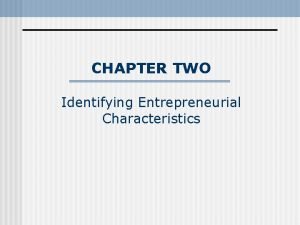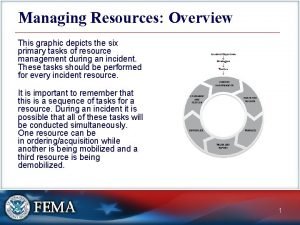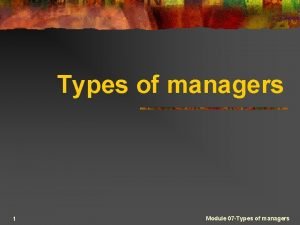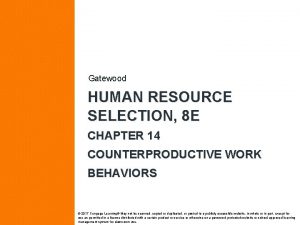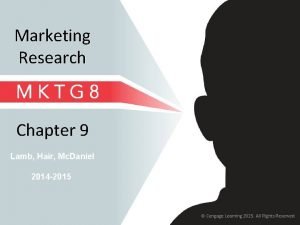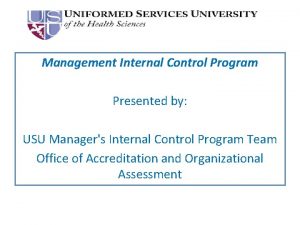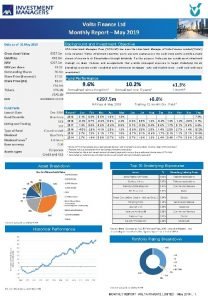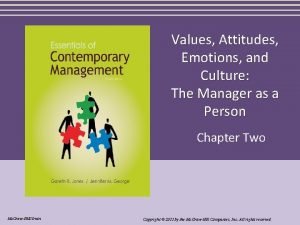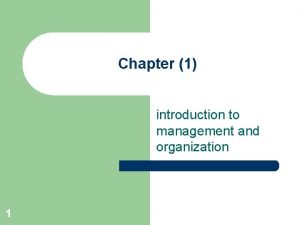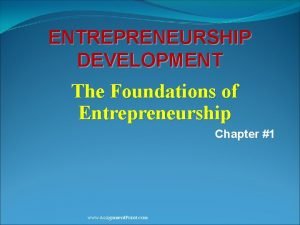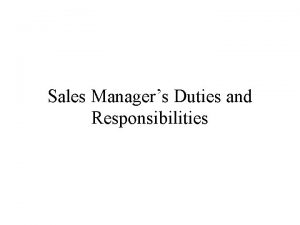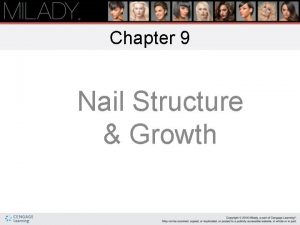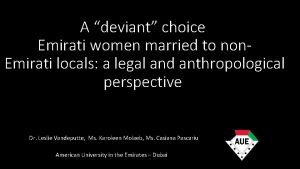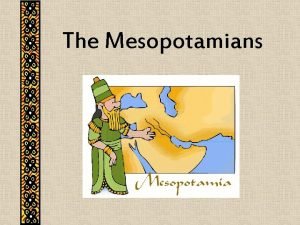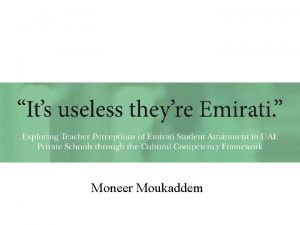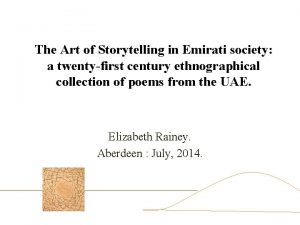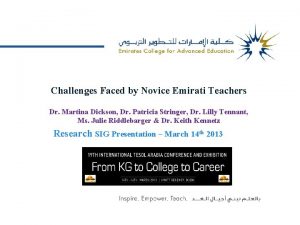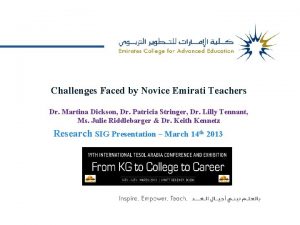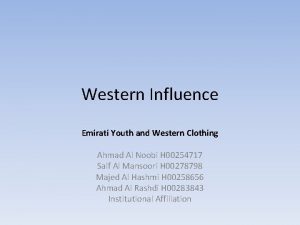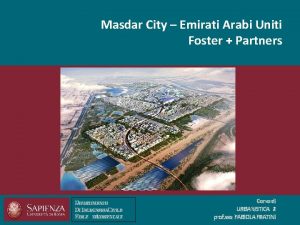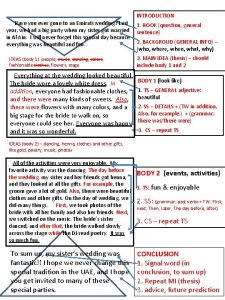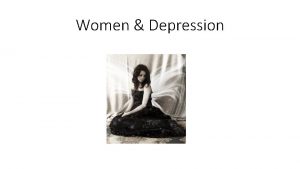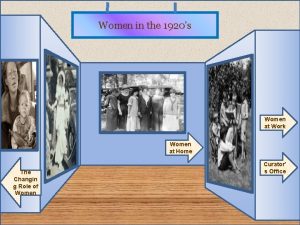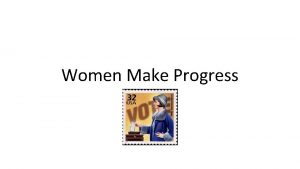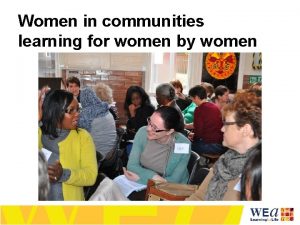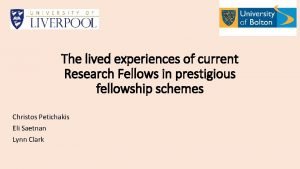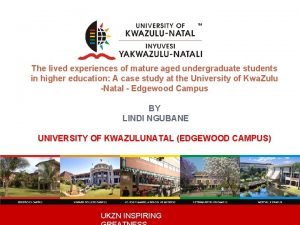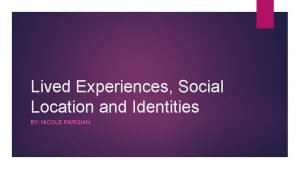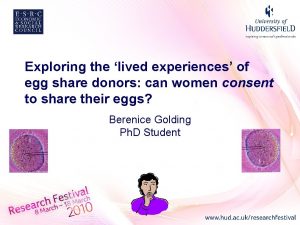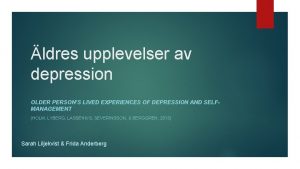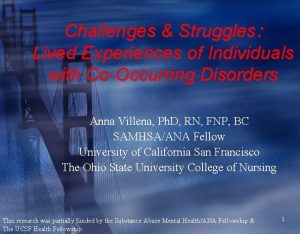Lived experiences of Emirati senior women managers in
































- Slides: 32

Lived experiences of Emirati senior women managers in higher education- a narrative analysis Presented by Dr. Gallie Kawanzaruwa, Ed. D At the GCES 2016 Synposium Arab Open University- Kuwait galkawa@yahoo. co. uk

Presenation outline • • • Introduction Overview Setting the scene Major findings from the Literature Theoretical framework and methodology Participants Narrative analysis Emerging themes Strengths Limitations Problems identified by th e. Literature

Introduction • Personal motivations • Motivated by my own rise from relatively humble up -bringing to later professional success achieved against the odds • Aim • To explore and understand reasons behind the accomplishments and lived experiences of five Emarati senior women managers in Higher Education in UAE using narrative analysis

Overview • A brief summary of the chapters

Setting the scene 1. Geography economy and demographics • Land mostly barren and largely hot, dry sandy desert • A federation of seven shiekhdoms-77, 700 square kilometers • 20% of the population are native citizens • 50% are Arabs, 40% from South Asia (Iranians, east Asians and Westerners make up the remainder)

2. Historical background • • • Formerly known as Trucial States (shiekhs bound by truces concluded with Britain in 1820) Became a federation in 1971 (Ras Al Khaimah joining in 1972) Impoverished country with a nomadic life style Transformation caused by the advent of oil (to become one of the highest per capita incomes in the world) Joined the Gulf Cooperation Council ( GCC) in 1981

3. Education in the UAE • • Free and universal right for all citizens (to higher education) Establishment of UAEU provided access to women Viewed as a tool to train citizens and reinforce cultural values Women’s education and empowerment supported by leadership (Sheikha Fatima bint Mubaraki- Chairwoman of the General Woman’s Union) • Education has not freed women from traditional hegemonic constrains including male domination (they have to seek permission from spouse or parent to work) • 4 women in cabinet • 9 women out of 40 in Federal National Council

4. Religious perspectives • • • Influence of religion marked and obvious Religious scholars who were women Muslim heads of states Islam is used by men to suppress women Laws are always man-made Women’s rights are limited to political participation

5. Patriarchal beliefs • • • Women’s participation in decision-making is limited ( e. g. inheritance, divorce, marriage, child custody and nationality) Defined hierarchy of roles Political, social, and economic policies effectively operate to reinforce existing social roles Girls are socialized differently from boys First priority for women is to fulfill domestic duties- their employment outside the home is looked down upon

Major findings from the Literature 1. Feminism-the general and Arab perspective • • • Women are gradually challenging patriarchal discourses while still maintaining a connection to societal norms The importance of culture to women-they would want to conform to what culture expects of them Islamic principles core to their emancipation There is no place for Western feminism in the Arab world Women are fighting for equal place but not at the expense of recourse to traditional norms

2. Global picture • • • Women struggle is international Women make less than half in tertiary level teaching in most global regions Cultural attitudes and practices form key impediments In UK significant gender differences still exist in HE institutions There more examples in Australia, USA and Europe

3. Closing the gender gap • • • There are some women in senior positions in HE Most research about UAE is done outside Policy decisions to be made on local realities and not international opinions UAE lagging behind in gender balance ( position 108/128) Arab societies reluctant to abandon traditional expectations

4. Attitudes towards women managers and barriers to progression • • • Women are still under represented in senior positions in HE Women mostly assigned to nurturing positions ( Dean of student affairs) Family holds a central position in women’s lives to make any career decisions ‘wasta’ still plays an important role in accessing opportunities The role of women in management positions cannot be treated in isolation from their societal status Barriers are rooted in patriarchal male-dominated society

Theoretical framework &Methodology 1. Critical feminist perspective as a research paradigm • • Feminist research is located in the critical theory which views the role of the researcher as detached, neutral and objective but inseparable from personal values observed through personal experiences Feminist research is motivated by the desire to change social institutions, society and organizations It takes women’s concerns, situations, perceptions and experiences as the basis for research It pays attention to marginalized groups of people and gives a voice to the voiceless

2. Narrative inquiry as the research method and its criticisms • • The process of gathering data for the purpose of research through story-telling (social research) Not used to confirm theory but clarify and explain women’s experiences. Reliability is based on the validation from the participants Stories helped women to make sense of their experiences The researcher’s presence bias and subjectivity when presenting the stories Uses a small sample and mostly not generalizable Has low external but high internal validity The presence of the narrator's voice in interpreting

Participants’ pen portraits 1. Asma- hailing from Dubai • Humble background • Over 50 years and not married • Qualified psychiatrist and holding a PHD from University of London • Assistant Dean, Vice Dean, Dean and President • Influenced by mother’s determination ‘’While I was in Cairo, I found myself diverted… although I’m a medical student, most of the time, I was attending a lot of activities in culture and politics, art and cinema; very little time for my career as a medical student. This opened doors for me to be very close to a very defined type of people… three with Ph. Ds, me from London University… or another one and my sister from Cairo… I decided to focus on medicine because I realised that when I became a doctor, …I would be putting my patients at risk if I was half a doctor… thank God, I became a very good psychiatrist and got my Ph. D from London University. I have published around 45 papers, all in international journals. ’’

2. Fatima- from Dubai • • • Humble background Over 50 years and not marred With a PHD in Pilitical Science from University of cairo Highly published and head of department Not married Influential individual-father “Most notable are changes that have occurred towards the treatment of women in UAE. But now many things in my society have changed so to find the women in high positions or in politics or any subject it is very easy now, because things have changed but in my generation or the generation before I think they were pioneers…but what happened now with the empowered women…they choose any name without strong background, then when she or he is in the position, I think you can see the difference between someone who built herself up day by day and someone who gets the job suddenly, just because she has a chance in what they call ‘empowered women’, or ‘empowering the new generation’…

3. Ayesha from the City of Timba- eastern cost • • • Humble background Holds bachelors degree from UAEU Masters and PHD from the UK Associate Dean, Assistant Dean and Dean of Students’ Affairs Not married Influenced by her aunt ‘Definitely there are changes that took place as part of civic society and modernity in the UAE, starting from the 1980 s, started to take big strides in education and economics. There a lot of issues that started to thrive after the oil boom. Definitely this has affected and impacted us in one way or another’. ‘Going for a BA, to be educated and then having to go to study abroad, this was a big question… to leave… it was a challenge for me to convince my parents that I was going abroad – but I did in the end. I went and they said she will go for her MA and she will find it difficult when she comes back;

4. Amna- grew up in a small Bedouin village • Bachelors degree from UAEU • Masters and PHD from US • Assistant Dean of Student affairs, Department Chair; School of Education • Married with 4 children • Influenced by a her teacher and mother ‘My family was resistant when I had to go abroad to study. It had not happened before that the first daughter had to go to university. Most girls got married by the 10 th grade or G 11 so my father was telling me that when I finished high school, I did not have to go to university; I could get married. But my mother said no, and that I could continue with my education. . . without any certification, how will I continue in life? ’

5. Amal- from Sharjah The only one who did not come from a humble background Over 50 years and divorced at 24, with 4 children A star student from school days Holds a Masters and PHD from the UK Assistant Professor, Course Director, Director of English language Center ‘Yes, in the 1980 s, women felt shy and unaccepted to work with a man. I refused some promotions for prestigious jobs in the 1980 s because I felt myself that it’s unaccepted by society. This idea remained till 1995, after that a real change took place and women could work in any job. ’

Narrative Analysis • Analysis of narratives to interpret various aspects of the topic • Transcripts were cross analyzed by reading and re-reading in an active way • Generation of initial codes • Searching for themes • Reviewing themes • Defining and naming themes • Producing a report

Emerging Themes 1. Support received from individuals at different times • • • 2. Early childhood Influential individuals Female role models Opportunities provided by political, cultural and structural changes in the UAE • • • 3. Perceptions at youth Cultural influences and the role of the government Institutional and professional support Personal resilience and resolve to succeed • • • 4. Family background Embodied capital (what an individual knows and can do through learning) Motivation for leadership Importance of the Islamic faith • Gender separation and faith in the workplace

Strengths of the reserach 1. Sample used- Emirati women to arrive at reliable and valid findings 2. The age of the sample- had witnessed preindustrial and seen the advent of change 3. Valid and reliable data collection and analysis methods

Limitations of the research 1. Qualitative – subjective ( low external validity) 2. Sample cannot be generalized 3. Findings lack the views of women from different sectors of the society 4. Non-inclusion of young women 5. Involvement of men in the research

Recommendations 1. 2. 3. 4. 5. 6. 7. Developing leadership in women as early as secondary school Conscientization of the boy child by raising them the same way as the girl child Anti discriminatory policies to be legislated Increase the number of accredited institutiions of higher learning in the UAE to increase the number of women in senior leadership positions Implement fully the teaching of Islam which sees women as equals Regulate academic institutions’s promotional policies that support a quota for women Increase financial support for HE to poor families

References (1) Abdalla, Ikhlas A. (1996). ‘Attitudes towards Women in the Arabian Gulf Region’. Women in Management Review 11(1): 29– 39. Abdelkarim, A. (2001). ‘UAE labor market and problems of employment of nationals: an overview and policy agenda’. TANMIA - Center for Labor Market Research & Information, 1: 1 -56. Abdulla, A. & Ridge, N. (2011). ‘Where all the Men? Gender Participation and Higher Education in the United Arab Emirates’, Dubai School of Government Working Paper Series, No 11– 03. Abuznaid, S. (2006). Islam and management: What can be learned? International Business Review. Wiley Online Library Ahmed, L. (2002). Women and Gender in Islam: Historical roots of a modern debate, 2 nd ed. Yale University Press. Al-Ali, N. (2000, April). Feminism and Islamic Fundamentalism: The Limits of Postmodern Analysis: by Haideh Moghissi, 166 pages. Zed Books, London and New York, USA, 1999. UK£ 13. 95 paper. In Women's Studies International Forum (Vol. 23, No. 2, pp. 264 -265). Pergamon. Federal National Council of the UAE (2006), ‘Education and Gulf Women: The Example of the UAE, ’ Parliamentary Discussion Paper: 2– 3. Findlow, S. (2005). ‘International Networking in United Arab Emirates Higher Education: Global-local tensions’. Compare 35(3): 285– 302. [Taylor & Francis Online]

References (2) El-Rahmany, S. (2002). ‘Women in the Arabic World: from role conflict to effective participation’. Al-Mustaqbal Al Arabi (The Arab Future), September 2002. Center for Arab Unity Studies, Beirut: 93– 107. Assad, C. (2008). ‘Gender Equality in the UAE: A driver for increased competitiveness’. Dubai School of Government: Policy Brief 5. Barakat, H. (1985). ‘The Arab Family and the Challenge of Change’. In: E. W Fernea (Ed. ), Women and Family in the Middle East. Austin: Texas University Press. Emirates Center for Strategic Studies and Research (ECCSR). (2004). Youth in the UAE: Contrasting positions and roles. Abu Dhabi. Ghubash. R, (2011) The Contribution of Women to Intellectual Thought and Science in the Arab World. Dubai School of Givernance. Policy Note 3. Moghadam, G. (2006). Patriarchy and Development: Women’s Positions at the End of the Twentieth Century. Oxford: Clarendon Press. Moghadem, V. (2003). ‘Patriarchy in Transition: Women and changing family in the Middle East’. Journal of Comparative Family Studies. 35(2): 137 -62 Gallant, M. and Pounder J. S. (2008). ‘The Employment of Female Nationals in the United Arab Emirates (UAE): An Analysis of Opportunities and Barriers’. Education, Business and Society: Contemporary Middle Eastern Issues 1(1): 26– 33.

References (3) Findlow, S. (2007). ‘Women, Higher Education and Social Transformation in the Arab Gulf’. In: C. Brock and L. Z. Levers (eds. ), Aspects of Education in the Middle East and North Africa. Oxford Studies in Comparative Education. Oxford: Symposium Books: 57 -76. Findlow, S. (2008). ‘Islam, Modernity and Education in the Arab States’. Special Issue: Religion, Intercultural Education 19 (4): 337– 52. Gallant, M. (2010). Broken Silence: a commentary on women’s entrepreneurship in the United Arab Emirates. The International Journal of Entrepreneurship and Innovation 13(2) 81 -92. Madsen, S. R. (2008 a). On Becoming a Woman Leader: Learning from the Experiences of University Presidents. San Francisco, CA: Jossey-Bass. Madsen, S. R. (2008 b). Developing Leadership: Learning from the Experiences of Women Governors Lanham, MD: University Press of America. Madsen, S. R. (2009 a). ‘Transformational Learning Experiences of Female College Students’, Education, Business and Society: Contemporary Middle Eastern Issues 2(1): 20– 31. Madsen, S. R. (2009 b). ‘Leadership Development in the United Arab Emirates: The Transformational Learning Experiences of Women. ’ Journal of Leadership and Organizational Studies 17(1): 100– 10. Madsen, S. R. & Cook, B. J. (2010) ‘Transformative Learning: UAE, women, and higher education’. Journal of Global Responsibility 1 (1): 127 -48.

References (4). Moghadem, V. (2005) ‘Women’s Economic Participation in the Middle East’, Journal of Middle East Women’s Studies 1 (1): 110 -46. Mostafa, M. M. (2005) ‘Attitudes Towards Women Managers in the United Arab Emirates: the effects of patriarchy, age, and sex differences’, Journal of Managerial Psychology 20 (6): 522 -40. Omair, K. (2008). ‘Women in Management in the Arab Context’. Education, Business and Society: Contemporary Middle East Issues 1(2) 107 -23. Omair, K. (2011) ‘Women’s Managerial Careers in the Context of the United Arab Emirates’, Academic dissertation, Jyvaskyla University School of Business and Economics. Radharkrishan, S. (2009) ‘Professional Women, Good Families: Respectable femininity and the cultural politics of a ‘new’ India’. Qualitative Sociology 32(2): 195 -212. Ridge, N. (2009). ‘Hidden Gender Gap in the UAE’. Dubai School of Government: Policy Brief 12.

Stress Test The following slide is a picture of 2 identical dolphins. The photo was used at a medical research centre in a case study on stress levels. A scientific study revealed that, in spite of the fact that the dolphins are identical, a person under stress will find many differences between them. Look at the photograph. If you find more than one or two differences, you can leave the session now.


Thank You ?
 Dubai na kom kontinentu se nalazi
Dubai na kom kontinentu se nalazi Ujedinjeni arapski emirati glavni grad
Ujedinjeni arapski emirati glavni grad Ethnocentric orientation example company
Ethnocentric orientation example company A carefully developed overall approach to leading
A carefully developed overall approach to leading What is the trade show managers first priority?
What is the trade show managers first priority? Cultural constraints in management theories
Cultural constraints in management theories Juniper wlan controller
Juniper wlan controller Ucla fau
Ucla fau Distinguish between entrepreneur and manager
Distinguish between entrepreneur and manager Difference between entrepreneurs and managers
Difference between entrepreneurs and managers A benefit from budgeting is that it forces managers to
A benefit from budgeting is that it forces managers to Dwp partnership managers
Dwp partnership managers Emergency managers weather information network
Emergency managers weather information network Global managers
Global managers Managers and management chapter 1
Managers and management chapter 1 Effective communication
Effective communication Managers interest in a business
Managers interest in a business Difference between manager and entrepreneur
Difference between manager and entrepreneur Manager is someone who
Manager is someone who Incident managers begin planning for the demobilization
Incident managers begin planning for the demobilization Types of level management
Types of level management Managers can use overt integrity tests to
Managers can use overt integrity tests to Marketing research helps managers gauge
Marketing research helps managers gauge Managers internal control program
Managers internal control program Axa investment manager paris
Axa investment manager paris Managers who are low on extraversion tend to
Managers who are low on extraversion tend to How to classify managers in organizations
How to classify managers in organizations Ten deadly mistakes of entrepreneurship
Ten deadly mistakes of entrepreneurship Introduction to management chapter 1 notes
Introduction to management chapter 1 notes Sales managers duties
Sales managers duties What do managers do
What do managers do Are managers born or made
Are managers born or made Describe a normal healthy nail
Describe a normal healthy nail

